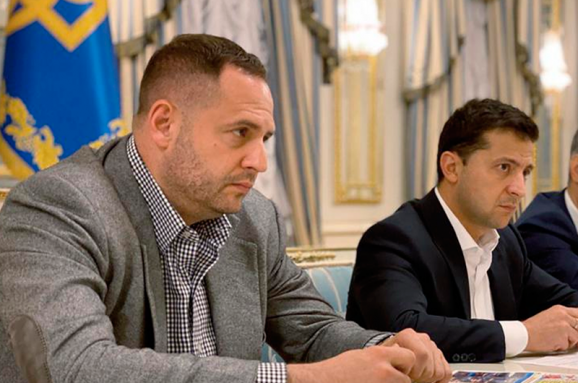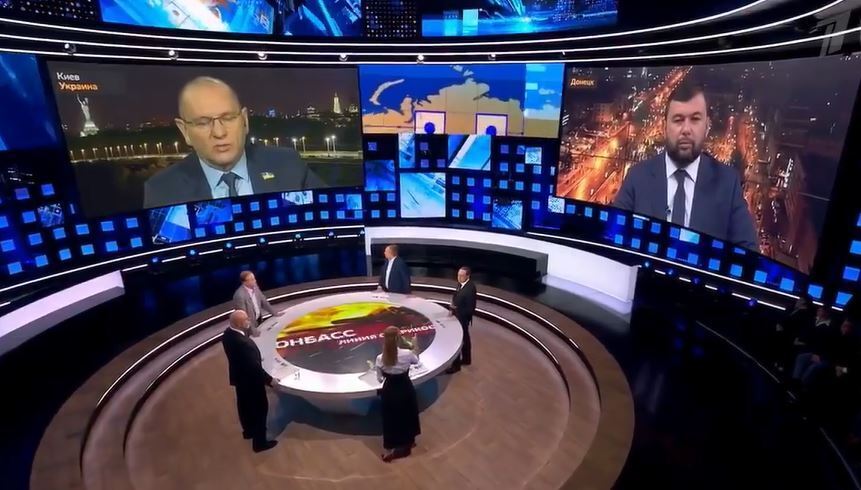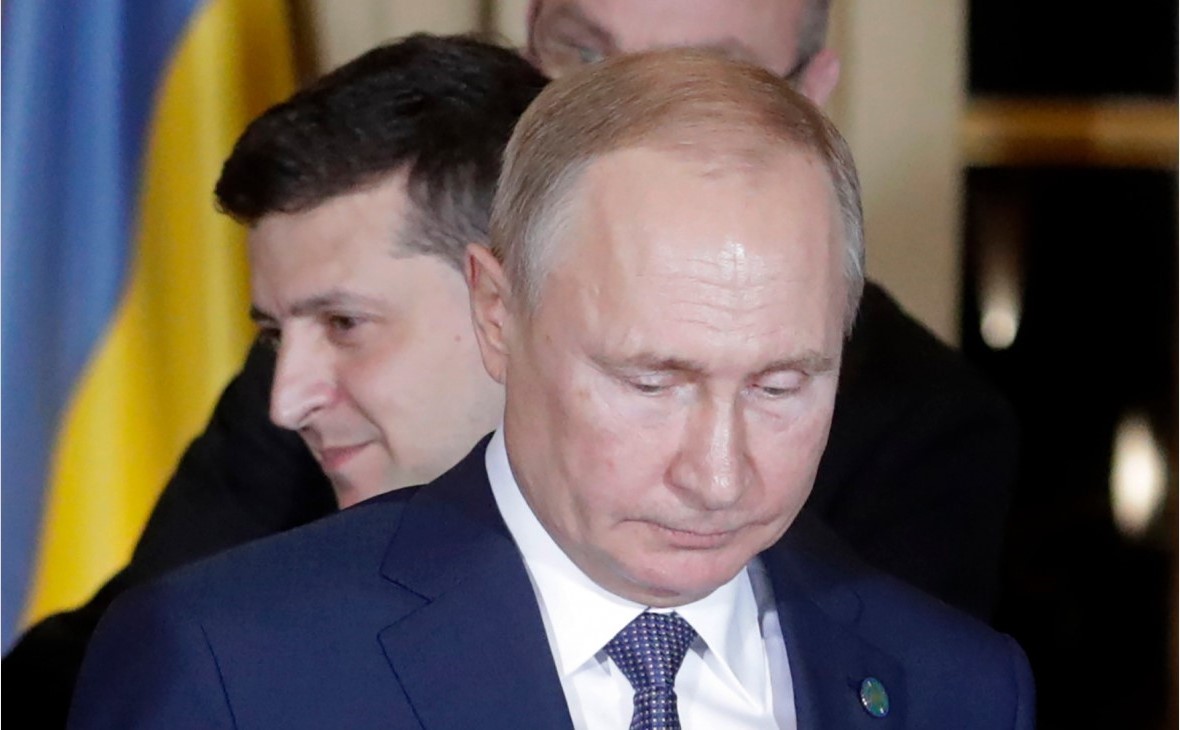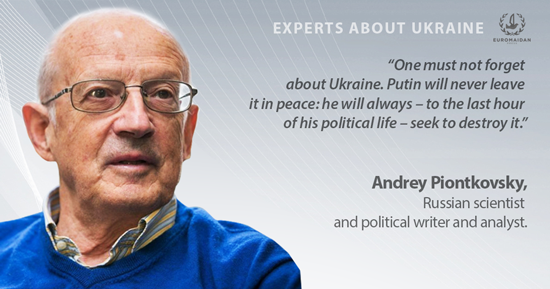Russia’s presidential envoy, Dmitry Kozak, had initiated the plan and prepared the documents for the Contact Group’s preceding meeting, on March 11, in Minsk. The Ukrainian presidential envoy, Andrii Yermak, accepted the plan; and both presidential envoys shepherded the documents through the Contact Group for preliminary approval. The documents were kept secret, pending the final approval that was expected on March 25 but did not materialize. However, the documents’ full text leaked to the Ukrainian media (Dzerkalo Tyzhnia, March 12).
The “foreign affairs ministries” in Donetsk and Luhansk sounded as pleased with the preliminary approval of the consultative council as they sounded disappointed by the halt at the Contact Group’s videoconference (Donetskoye Agentstvo Novostey, Dan-news.info and Luhanskinformtsentr, Lug-info.com, March 11, 25; TASS, March 11, 25).
The Contact Group’s March 11 meeting in Minsk was unprecedented in significant ways. For the first time in the Contact Group’s six-year existence, officials on such a high level as Kozak and Yermak attended a meeting and countersigned the documents. The delegates from Donetsk and Luhansk were allowed to sign with the formula „plenipotentiary representatives.” This is highly unusual, probably unprecedented, and a symbolic step toward quasi-recognition of the “certain areas’ ” right to have their “plenipotentiaries” accredited, on a par with recognized diplomats, in the Minsk process. The Donetsk and Luhansk “plenipotentiaries” signed the document alongside Ukraine’s former president Leonid Kuchma, Russia’s ambassador Azamat Kulmukhametov, the Organization for Security and Cooperation in Europe’s (OSCE) special representative Heidi Grau (Swiss diplomat), as well as Kozak and Yermak.
The Consultative Council would include the same five actors as the Contact Group, but it defines their status in different ways. The status changes clearly favor the triple-headed Russian side, to Ukraine’s disadvantage.
According to the founding document (Dzerkalo Tyzhnia, March 12), the Consultative Council would officially cast the Ukrainian side and Russia’s proxies as coequal parties on two levels: that of an inner-Ukrainian conflict, and that of a direct dialogue between them, implying de facto recognition of Russia’s proxies. Russia is positioned officially as an impartial observer, relieved of its responsibility as a party to the conflict (indeed the conflict’s organizer).
The Council would function within the Contact Group’s own working group on political affairs, as per the founding document. Based on parity and direct dialogue between Kyiv and Donetsk-Luhansk, the Consultative Council would work out “political and legislative decisions” for implementing the Minsk “agreements” in Ukraine’s legislation. Evidently, it can refer such decisions to the Contact Group’s political working group; but just as obviously, it can short-circuit the Contact Group by means of direct negotiations between Kyiv and Donetsk-Luhansk in the Consultative Council.
This initiative proceeds from the “necessity of a comprehensive political settlement of the conflict” and singles out “elections” in Donetsk-Luhansk in this regard. But it omits any mention of the security prerequisites to elections and to any political settlement, undermining Kyiv’s defense of the “security first” principle.
The Consultative Council would comprise ten representatives “of Ukraine [sic]” with voting rights and ten representatives of Donetsk-Luhansk with voting rights. Kyiv, Donetsk and Luhansk each would independently appoint their respective representatives to the Council. All this nixes Zelenskyy’s calls for talks involving Ukrainian loyalists from either side of the Donbas demarcation line. The founding document would have the Council’s meetings “moderated” by an OSCE representative, assisted by two deputy moderators from Ukraine and two deputy moderators from Donetsk-Luhansk. This reduces the OSCE from the mediator to a co-moderator, which the OSCE seems to accept having signed, and which brings Kyiv into direct dialogue with Donetsk-Luhansk.
The OSCE itself would be entitled to one consultative voice; while the Russian, German, and French governments (the Normandy forum’s members minus Ukraine) would obtain one consultative voice each. The Consultative Council itself would adopt its own ground rules and working procedures. The Council shall make “decisions” with a two-thirds majority of its voting members, according to the founding document (Dzerkalo Tyzhnia, March 12).
Ubiquitous references to the council’s “decisions” contradict the pretense that this council would merely be advisory. It is plainly intended as a potential decision-making body. It reflects Russia’s method as seen in Abkhazia, South Ossetia, Transnistria and, more recently, Donbas. When Russia moves from instigating and conducting the conflict to ostensibly mediating the conflict, it insists that conflict-resolution is up to the local parties to negotiate, even as Russia itself manipulates the process politically and militarily. In this case, Russia needs the Consultative Council to orchestrate a “dialogue” between Kyiv and Donetsk-Luhansk. It could then bring any decisions from this Consultative Council to the Contact Group for pro forma endorsement, making the Contact Group redundant (the more so as the same set of actors sit in the Contact Group).
The Consultative Council’s decisions shall be recommendatory, according to its founding document. The recommendations would be addressed to the Minsk Contact Group’s working group on political affairs, according to Kozak’s and the OSCE’s otherwise tight-lipped concluding remarks. Kozak pointed out that Kyiv and Donetsk-Luhansk would, as parties to the conflict, jointly work out political recommendations for conflict-settlement in the Consultative Council (TASS, Osce.org, March 12).
According to an accompanying protocol, consultations should be held with “representatives” (level unspecified) of France and Germany and the OSCE before the final signing of the Consultative Council’s founding document on the target date of March 25. Kyiv is apparently waiting to hear from Paris and Berlin.
Moscow, however, can be expected to promote this agreement in subsequent Contact Group meetings. Once the regular face-to-face meetings resume in Minsk, the technical excuse for not signing will disappear. At that point, Zelenskyy’s mettle and Yermak’s bona fides will be tested again.
Read More:
- Kyiv finds an alibi to step back from Kozak-Yermak plan on Donbas
- Donbas peace talks group meets online, averts highly criticized agreement meant to include Russia-run “people’s republics”
- Ukrainian volunteer medic lives outside President’s office, protesting Russian peace push
- Russia to drastically expand its influence over Ukraine, rest of post-Soviet space
- Russia to become observer instead of party to conflict under proposed Donbas negotiation format, MP Yasko says
- Ukrainians launch online protest against recognition of Russian-run “Donbas republics” set for 25 March
- Ukraine’s president Zelenskyy turns blind eye to Putin-Medvedchuk scheming
- Ukraine’s government has ventured into dangerous waters, but it’s not too late to set the boat on course – Marynovych
- Russian electronic warfare in Donbas: Training or preparation for a wider attack?
- The pro-Russian network behind coronavirus riots in a small Ukrainian town
- Quarantine parliament: Ukrainians rally against using coronavirus situation to rush treasonous laws
- Shady agreements legitimizing Russia’s puppet “republics” likely signed in Minsk








